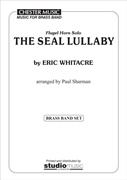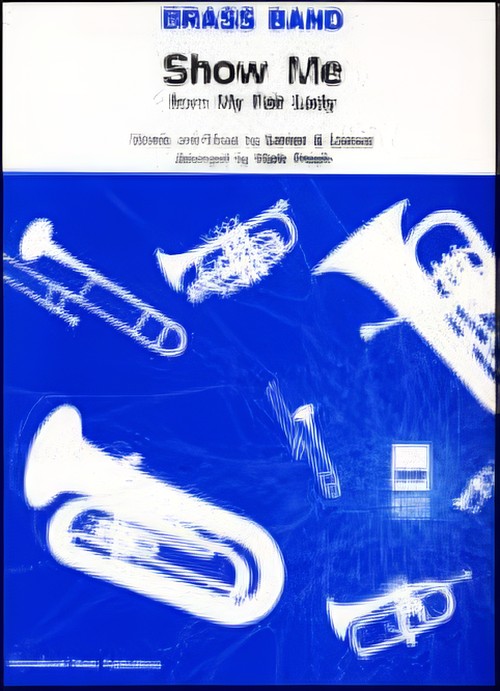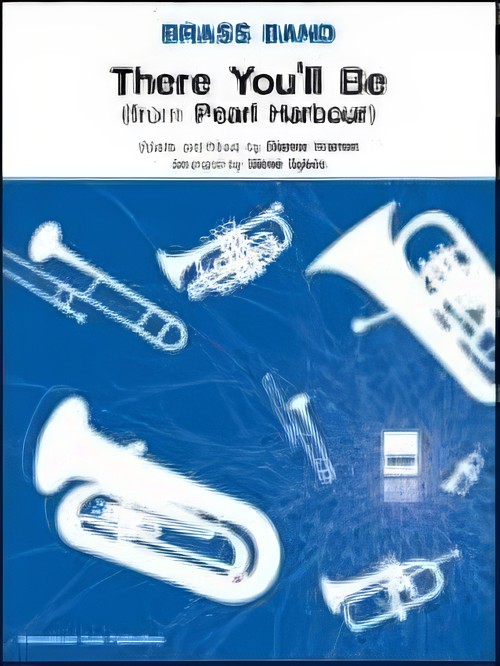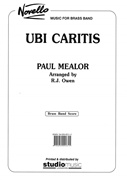Results
-
 £59.99
£59.99Marching Blues (Brass Band - Score and Parts)
Marching Blues was written in the blues and swing-jazz style of the great big bands. It is an ideal show march that can be used for encores, popular performances, family concerts and much more. As an added entertaining feature why not get your Eb bass player to stand for his/her 28-bar solo! From small ensembles to large bands, Marching Blues will bring great joy to all generations of performers and audiences on many occasions. 04:00
Estimated dispatch 7-14 working days
-
 £54.99
£54.99Only Time (Brass Band - Score and Parts)
For many years Enya has been selling as many records as pop goddesses like Madonna and Britney Spears. But it was the events of September 11, 2001 that truly brought this Irish singer to the world stage with CNN broadcasting her ballad Only Time with the tragically dramatic images around the World Trade Center in New York. Ron has arranged this moving song in his own familiar creative way 03:00
Estimated dispatch 7-14 working days
-
 £57.50
£57.50Over the Rainbow (Eb or Bb Cornet Solo with Brass Band - Score and Parts) - Arlen & Harburg - Morrison, Alan
Recently voted the greatest family film of all time the classic Wizard of Oz is one film that everybody knows. The film theme was re-invigorated with the release in 2004 of a new version by the relatively unknown Australian vocalist, Eva Cassidy. Unfortunately Eva Cassidy is no longer with us but this song will give generations of new music listeners an insight into her amazing vocal abilities and talent. The world-renowned Cornet soloist, Alan Morrison, has taken the Eva Cassidy version and crafted a wonderful Cornet solo in this award-winning arrangement. A wonderful chance to showcase either your Bb or Eb Cornet soloist in a work guaranteed to have your audiences in awe.
Estimated dispatch 7-14 working days
-
 £58.60
£58.60PORTRAIT OF RAY CHARLES, A (Brass Band) - Charles, Ray - Smith, Sandy
Grade: Medium. Includes: Hallelujah I Love Her So; Georgia on My Mind; Hit the Road Jack; I Just Can't Stop Loving You.
Estimated dispatch 7-14 working days
-
 £42.95
£42.95SEAL LULLABY, The (Flugel Horn Solo with Brass Band) - Whitacre, Eric - Sharman, Paul
This loving and dreamlike work captures the undulating rhythm of a mother rocking her child to sleep. The piece was inspired by classic Rudyard Kipling: "Oh! Hush thee, my baby, the night is behind us, And black are the waters that sparkled so green. The moon, o'er the combers, looks downward to find us, At rest in the hollows that rustle between." Magical!
Estimated dispatch 7-14 working days
-
 £34.99
£34.99Show Me (from My Fair Lady) (Brass Band - Score and Parts) - Lerner & Loewe - Freeh, Mark
The musical My Fair Lady (a book and lyrics by Alan Jay Lerner and music by Frederick Loewe), is based on George Bernard Shaw's Pygmalion. Show Me, arranged by Mark Freeh, is taken from Act II of My Fair Lady and is when Liza storms out of Higgins' house to stumble outside into Freddy. Freddy protests that he is in love with her, but Liza is sceptical and brushes him off.Suitable for Advanced Youth/3rd Section Bands and aboveDuration: 4.00
Estimated dispatch 7-14 working days
-
 £35.00
£35.00There You'll Be (from Pearl Harbour) (Brass Band - Score and Parts) - Warren, Diane - Sykes, Steve
Diane Warren is one of the greatest songwriters of today and her song There You'll Be was featured in the film Pearl Harbour starring, Ben Affleck and Kate Beckinsale. This brass band arrangement has been made by Steve Sykes.Suitable for all Advanced Youth/3rd Section Bands and aboveDuration: 8.00
Estimated dispatch 7-14 working days
-
 £42.95
£42.95UBI CARITAS (Brass Band) - Mealor, Paul - Owen, R. J.
Composed for the marriage of His Royal Highness Prince William of Wales, K.G. to Miss Catherine Middleton. First performed by the Choirs of Westminster Abbey and Her Majesty's Chapel Royal, St James's Palace, conducted by James O'Donnell, at Westminster Abbey, Friday 29 April 2011. Duration: 4:00
Estimated dispatch 7-14 working days
-
 £42.95
£42.95WHEREVER YOU ARE (Brass Band) - Mealor, Paul - Stubbs, Duncan
Commissioned by Gareth Malone for Series Four of BBC TV's 'The Choir' and first performed by Malone and The Military Wives Choir as part of The Royal British Legion's Festival of Remembrance at the Royal Albert Hall on 12 November 2011, in the presence of Her Majesty The Queen. The text is taken from poems, letters and prayers written by the Military Wives, selected and adapted by Paul Mealor, and a passage from the Book of John. Selling a staggering 556,000 copies in the week leading up to Christmas, more than the rest of the Top 12 combined, Wherever You Are became the UK's Official Christmas No. 1 of 2011. A wind band version is also available. A contribution from the sales of the sheet music will be donated to the two nominated charities: The Royal British Legion and SSAFA Forces Help.
Estimated dispatch 7-14 working days
-
 £59.95
£59.95John O'Gaunt (Overture) (Brass Band - Score and Parts) - Vinter, Gilbert
Concert Overture for Brass BandIn the year 1340 in the town of Ghent, a son was born to Edward III King of England and his Queen Phillipa. The boy, afterwards known as John O'Gaunt (Ghent) grew up to be a warrior and before he was 20 he was fighting in France beside his brother, the Black Prince. For many years he was occupied with the wars in France and Spain and was seldom in England. His first two marriages brought him great riches and position, but the love of his life was Catherine Swynford, who bore him four children. Whilst he was away , his Palace of Savoy was burnt to the ground by the mob during the Peasant's Revolt. Finally in 1394 he returned home and married Catherine, for whom he felt a strong affection since her first marriage in St. Clement Danes Church in the Strand, many years before. The Beaufort children were thus legitimised and from them sprang a long line of English Kings and Queens.Duration: 9:30Recorded on Polyphonic QPRL068D Triumphant Rhapsody
Estimated dispatch 7-14 working days
